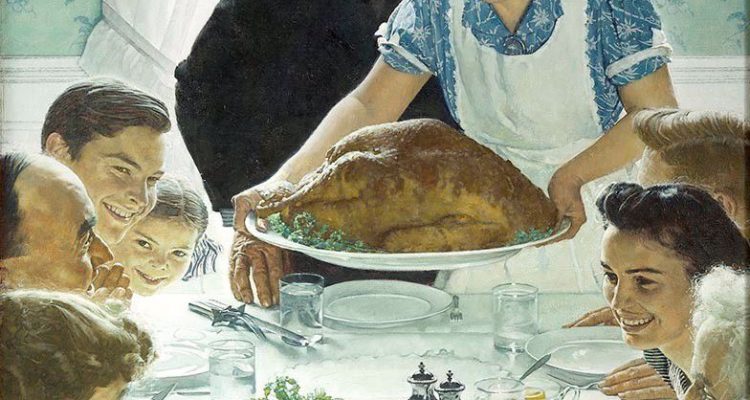Eleven months before the Japanese bombed Pearl Harbor on Dec. 7, 1941, and the United States’ subsequent entrance into World War II, President Franklin D. Roosevelt delivered to Congress in his State of the Union Address a declaration of fundamental freedoms that people “everywhere in the world” ought to enjoy: freedom of speech, freedom of worship, freedom from want and freedom from fear. This was a powerful message to not only the American public, but to the international community steeped in war across the globe. His speech provided to his critics a justification for our partial involvement in the war effort, supporting the Allies with desperately needed supplies, while also endowing people with rights they should be willing to fight for, not only for themselves, but for everyone.
Norman Rockwell, a painter and long-time illustrator for the Saturday Evening Post, was, like many other Americans, struck by Roosevelt’s proclamation. In 1942 and 1943, after the U.S. entered into the conflict, Rockwell turned his attention to war-time propaganda, publishing his famous “Rosie the Riveter” cover and the “Four Freedoms” series, directly based on Roosevelt’s speech. In “Freedom From Want,” currently hanging in the Norman Rockwell Museum, a family is gathered around a dinner table celebrating Thanksgiving in harmony. Nine members of this party, of varying ages, sit around a table, plates empty, laughing and waiting to dig in. The family matriarch places down a large turkey while her husband looks on happily, preparing to carve the roast. There are plenty of smiles and plenty of food; it is an image of peace. Rockwell painted it idealistically, creating the perfect American family eating the perfect Thanksgiving meal.
His painting, though a celebrated image of American values on a day we should enjoy and give thanks for everything in our lives, was not popular abroad. As a war raged halfway around the world, where families were starving or fleeing devastation, Europeans did not see this as a scene of freedom, but one of overabundance–of wanting too much–while others had too little, by no fault of their own. Rockwell also idealized this scene by ignoring so much of America in the 1940s. Poverty, racial discrimination and news of lossed loved ones was just as a part of American life at the time. While people starved on the streets, without a turkey to eat and nothing to give thanks to, this middle/upper-class family, exercising their “freedom from want,” is seemingly unaware of their own privilege and is unbothered by the fight for freedom hundreds of thousands of Americans were giving their lives for at that very moment.
As we go home for this holiday season, please safely embrace the ones you love, and destress from the world that has made all of us anxious. But, also be mindful that many other Americans will not be doing the same this Thanksgiving. The coronavirus pandemic is a real threat, one that has taken a toll on our country, and our world. With the effects it has wrought on our health and economy, think of what you can do to ease the burden–the pain–of even one family this Thanksgiving. If you’re going home next week, please consider donating to your local food pantry, volunteering at your local homeless shelter or doing some other act of kindness. Remind yourself that we are men and women for others, here to help those in need. Freedom from want is a nice idea, but we cannot reach that point as a society until we are all free from need.


Leave a Reply